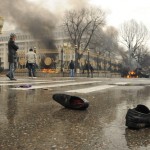Contributed by Jen Krausz, Bethlehem, PA
Warm-up Question
When would you rather be last at something, rather than first?
It’s Not Fair–Thank God
My father-in-law passed away over the summer. He was only 63, and our family was not ready for a leaky heart valve which led to a lengthy hospital stay, followed by strokes which left him comatose and unable to respond.
But in the weeks before the strokes, while he sat in the hospital waiting for his kidney function to stabilize, an amazing thing happened. His heart toward God changed.
A previous church had judged his family for the behavior of another family member instead of offering help or support. This unchrist-like behavior had turned him off to churches—we thought, for good. He was a loving father, grandfather and husband. He helped many people and treated others better than they deserved in many cases. He just didn’t want to get involved with churches anymore, and held God at a distance because of the way God’s people had treated him.
But when he landed in the hospital, he started talking to our pastor. People from church, many of whom he did not know, called and visited. They became the hands and feet of God to him, and he began to see, through this caring and through talks with the pastor, that God loved him. He expressed his wishes to join the church when he recovered, not knowing that the expected recovery would not take place.
At his funeral, the pastor was able to share this story of a man who discovered God’s love and salvation at the end of his life. What an inspiration to those who heard that story!
Discussion Questions
- Do you know anyone who is “turned off” to church because of a bad experience? What do you think might change someone’s mind once they’ve had an experience like this?
- What can churches do to minister to people who have been mistreated in the past?
- Do you think it matters to God whether someone comes to faith early in life or at the end of their earthly life? Why or why not?
Scripture Texts (NRSV) for Sunday, September 18, 2011 (Fourteenth Sunday after Pentecost)
(Text links are to Oremus Bible Browser. Oremus Bible Browser is not affiliated with or supported by the Evangelical Lutheran Church in America. You can find the calendar of readings for Year C at Lectionary Readings.)
For lectionary humor and insight, check the weekly comic Agnus Day.
Gospel Reflection
Wouldn’t it be great to work one hour and get paid the same as people who have worked an entire day? Absolutely, it would. However, would you like to be the person who worked all day and had to watch someone who only worked an hour get paid the same as you? Not likely.
However, would you like to be the person who worked all day and had to watch someone who only worked an hour get paid the same as you? Not likely.
Unfortunately, people who have followed Christ for many years can take the same attitude as these day-long laborers did in this week’s scriptures. According to these verses and others (such as Jesus’ promise to the thief on the cross that he would be with Jesus in Paradise on that same day), those who come to Christ at the end of their lives are promised the same reward: eternity with God in heaven.
Is that fair? Well, Jesus cautions, we may not want to be so focused on what’s fair. After all, let’s consider that Jesus’ payment on the cross for our sins wasn’t fair to him, was it? If things were really fair, we would all be in trouble! This parable reminds us that God is in charge, and it’s up to God to decide what happens to people. If God decides to give people every opportunity to find faith and salvation, even with their dying breaths (and it seems that God has), what is that to us?
I would add that there are many blessings in following Christ here on earth, so even grumbling about fairness is not really justified. In God’s economy, glorifying God also benefits us in many ways. Go figure!
I don’t know if you grew up like I did, hearing my parents use verse 16 of this scripture as a life lesson. Whenever my sister and I clamored to be the first to get or do anything, we heard, “The first shall be last, and the last shall be first.” And although we got tired of hearing these words, they were a good reminder that being first is not necessarily best in God’s eyes. God takes everything into account; even the last and least are important to God, and they should be important to God’s followers as well.
Discussion Questions
- Do you consider yourself to be a long-time follower of Christ or a new believer—or someone who is still seeking faith?
- If you consider yourself a long-time follower, how do you feel about those who come to faith at the very end of their lives?
- What special opportunities belong to those who are last (think about being last in line, last to do something)?
- Does your view of what’s fair change when you consider that no person deserves salvation or even God’s love?
Activity Suggestions
As a group or individually, commit to visiting at least one person who is in the hospital. It could be a church member, or a non-member that someone in the class knows. The purpose of the visit is not to evangelize, but to show love and concern. Pray out loud for the hospitalized person during the visit (ask first to make sure they are open to it).
Brainstorm other ideas for how to show God’s love to others in a non-judgmental way. There are many ways for students to do this in their daily lives—sitting with someone at the lunch table who normally sits alone, offering to help carry an injured student’s books, helping a struggling student with homework, treating brothers and sisters the way they would want to be treated, etc. It is so sad that so many people miss out on church (and God) because they have not experienced the love of God’s people! We as a church need to make sure we are reversing this trend, not reinforcing it.
Closing Prayer
Holy God, you can do anything in this world, but you choose to work through flawed people. Give us strength and willingness to be your hands and feet to the people around us, especially those who are hurting and need your love. Thank you for being unfair to us and forgiving our sins when we didn’t deserve it. In Jesus’name, Amen.





